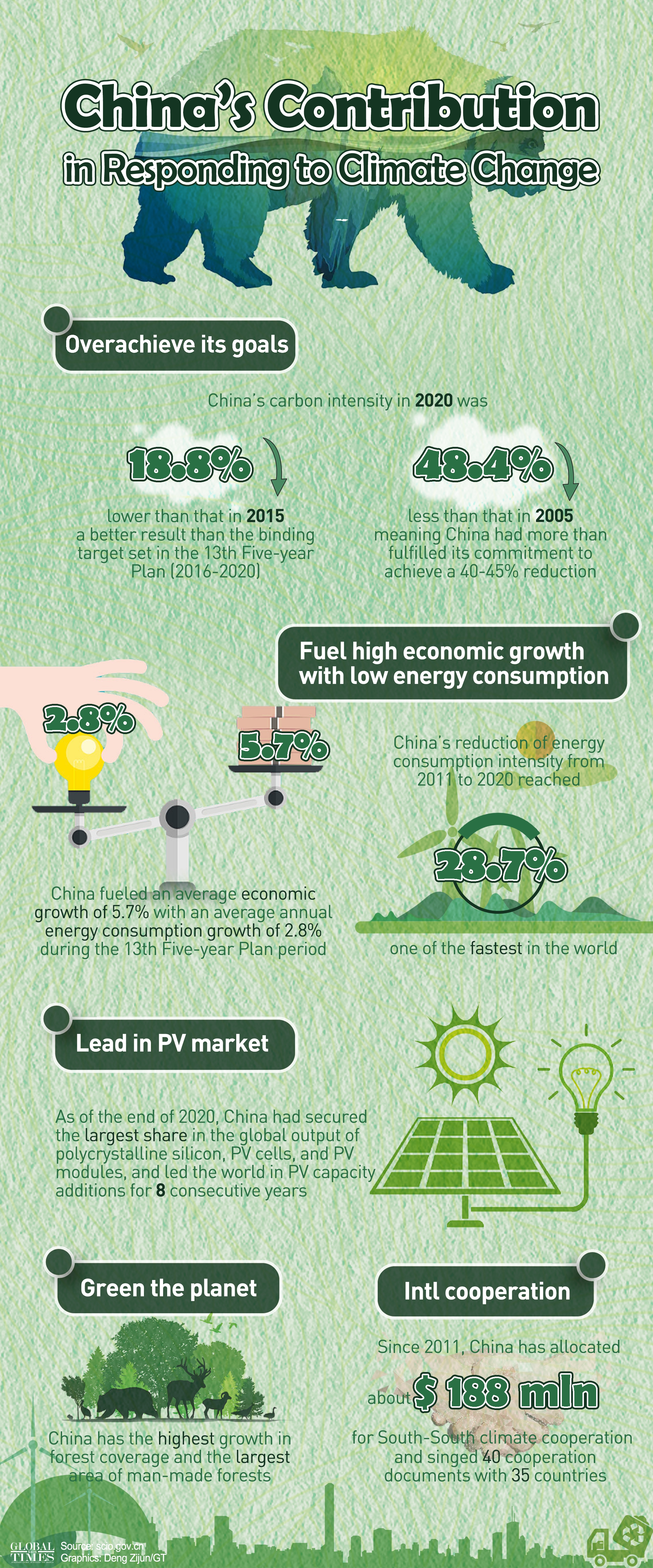
Aerial photo taken on Aug. 19, 2020 shows wind turbines in Jiucaiping scenic spot in southwest China's Guizhou Province.(Photo: Xinhua)
Less than one week before world leaders gather at the COP26 global climate summit in Glasgow, the UK, which is seen as a crucial event to discuss ways to curtail climate change, China issued a white paper on Wednesday to share with the world its dedication and experience in tackling global warming, injecting a strong impetus into the global effort to address the challenge.
The latest white paper, entitledResponding to Climate Change: China's Policies and Actionsand issued by the State Council Information Office of China on Wednesday, uses four chapters to describe China's ambitious goals in dealing with global warming, aiming to "enhance the understanding" of the international community about China's development, as well as its experience in tackling global warming.
It said that China's target of achieving peak emissions by 2030 and carbon neutrality by 2060 marks the world's highest reduction in carbon emission intensity and the shortest time in achieving the goal of going from carbon peak to carbon neutrality in global history.
When asked about China's expectations of COP26, Ye Min, vice minister of ecology and environment, said at a press conference on Wednesday that China hopes to finalize negotiations on the remaining piece of the Paris Agreement, make progress in supporting developing countries financially and technologically on the climate issue, and urge countries to fulfill their funding goals.
While some media reported that China is among the major emitters that have yet to submit a new climate target, Chinese experts refuted such claims, saying that as a responsible major power which carries out climate policies to achieve peak emissions and carbon targets, China will propose its own Nationally Determined Contribution (NDC), including a detailed road map and plans to achieve those targets.
"Those details are new, which shows that China treats the Paris Agreement seriously. For instance, they embody energy-saving targets by 2030 and 2060 and set targets for major authorities and departments," Yang Fuqiang, a research fellow at Peking University's Research Institute for Energy, told the Global Times on Wednesday.
China has also listed specific goals and measures to achieve its carbon emissions peak and carbon neutrality goals, such as banning unplanned new oil refining and coal-to-olefin projects, according to a sweeping policy guideline in a document jointly released on Sunday by the Communist Party of China Central Committee and the State Council, China's cabinet. This was believed to be the most comprehensive document on the country's path to carbon neutrality goals.
Climate observers predicted the Glasgow summit will witness the most severe conflicts as countries struggle to reach a consensus on climate goals. Yet they pointed out that Western countries, especially the US, should be blamed for "big words little action," and their all-for-themselves attitude on the climate issue.
The experts suggest that the best way to bear fruits of the COP26 summit is for the Western countries to cast aside their political prejudices, open arms to sincere cooperation and fulfill their promises.
Instead of dazzling attendants with new "targets," China would rather focus on how to realize current goals, a member of the Chinese delegation to the COP26, who requested anonymity, told the Global Times on Wednesday.
The anonymous delegation member said that the entire world is tired of empty promises made on the climate issue. He urged countries, especially Western countries, to meet their funding goals first before pointing fingers at other countries.
Before the COP26 summit, Chinese leaders have actively engaged in discussing climate issue with leaders of some European countries and the US. The latest case being Chinese President Xi Jinping's phone conversation with French President Emmanuel Macron on Tuesday, in which Macron expressed his hope in enhancing coordination with China on the COP26 summit.
Experts opined that there is abundant potential in the arena of climate change for China and Europe, as well as China and the US, to join hands.
For example, "in energy and economy transition, given the complementary relationship China and EU have in technology and capacity in clean energy and green economy, China and EU share a common goal and have broad space for cooperation. In industries such as photovoltaics, China has built a leading global production capacity. In terms of new technologies, new ideas, and policy measures, EU has achieved unique advantages," Cui Hongjian, director of the Department of European Studies, China Institute of International Studies, told the Global Times on Wednesday.
"At COP26 we must finalize the outstanding technical elements of the Paris Agreement, such as finding solutions on carbon markets and transparent reporting. We are accelerating collaboration between governments, business and civil society to deliver on our climate goals faster," UK Ambassador to China Caroline Wilson told the Global Times on October 13 in a written interview.
Analysts also noted that if China and the US - the world's single biggest emitter - can cooperate closely on tackling global warming, it will help motivate and unite other countries to work more closely on this issue.
Yang of the Peking University noted that some countries may bring up the question of adjusting the goal of limiting human-caused global warming to 1.5 C, which could become an interference and cause differences to the negotiations on technical terms and the implementing mechanism at the COP26. With the return of the US to the Paris Agreement, the Biden administration's attendance in COP26 shows that the US wants to regain its leadership on climate change issue, but it remains unknown if Washington could act to advance the process.
A UN report published on Tuesday said that the US is one of the several Group of 20 economies that haven't put policies in place to achieve the emissions targets of its previous plan submitted under the Paris accord, let alone its updated plan submitted from this year. The Biden administration has struggled to pass its emissions reduction plans through Congress because of opposition from Republicans and some centrist Democrats.
Divergences and using the climate issue to shore up global leadership clearly won't do any good to the multilateral climate agreement. Countries should not been blindfolded by geopolitics, climate scientists warned.

Graphics: GT
West's failed obligation
Observers predicted the COP26, which is slated to kick off on Sunday and runs for two weeks, will witness many fierce debates about the climate issue in a decade.
Financing climate change is also triggering a fracas. Many rich countries have failed to fulfill their obligation in aiding poor countries.
A report released by the UK said that governments of wealthy countries won't fulfill a pledge to provide $100 billion a year to help developing countries fight climate change until at least 2023.
The pledge, a key part of the 2015 Paris climate accord, had helped persuade developing countries to sign the deal and commit to limiting their own emissions.
However, China has helped build a fair, reasonable, and win-win global climate governance system, according to the white paper, saying it showcases China's image as a responsible country.
Apart from actively engaging in global climate negotiation, and safeguarding fruits of international treaties on global warming, China has expanded cooperation with other developing countries on this issue.
According to the white paper, China has allocated 1.2 billion yuan for South-South cooperation and signed 40 cooperation documents with 35 countries. It has also helped countries to build low-carbon demonstration zones and provided them with climate-related supplies.

China's Contribution in Responding to Climate Change.Graphic:Deng Zijun/GT













